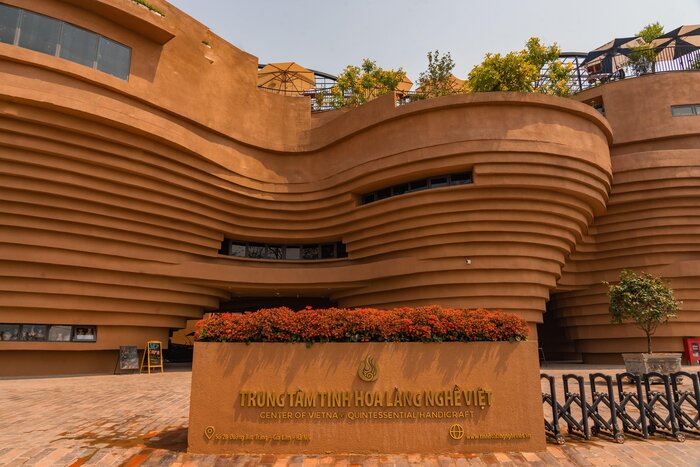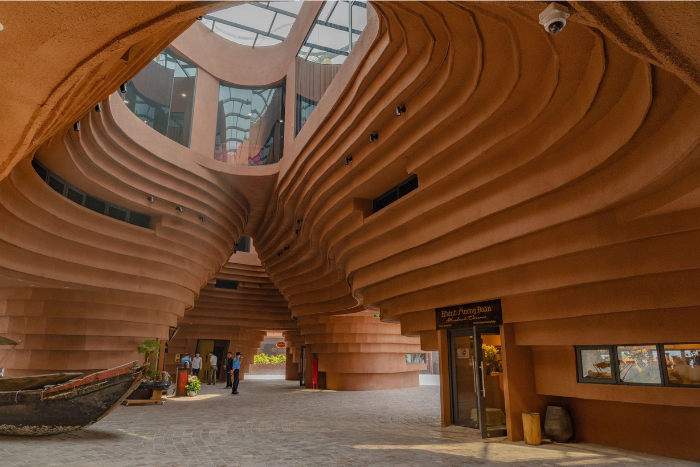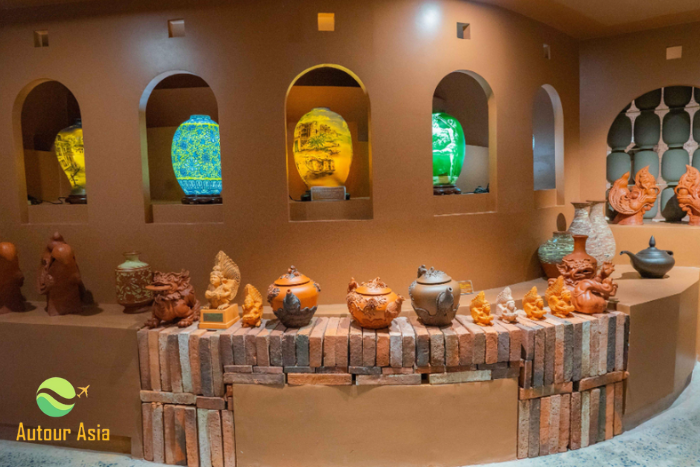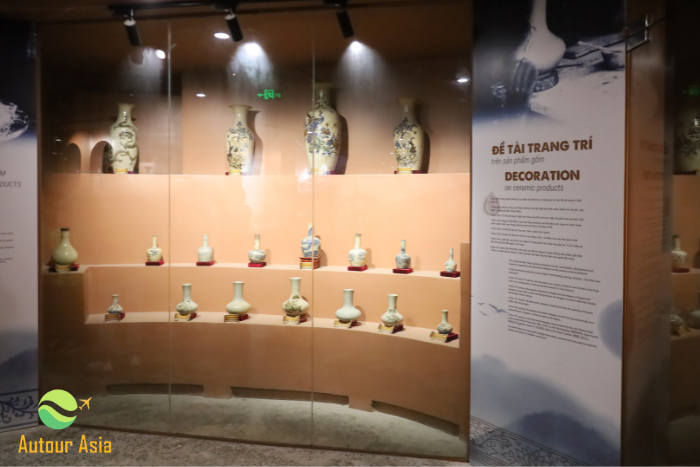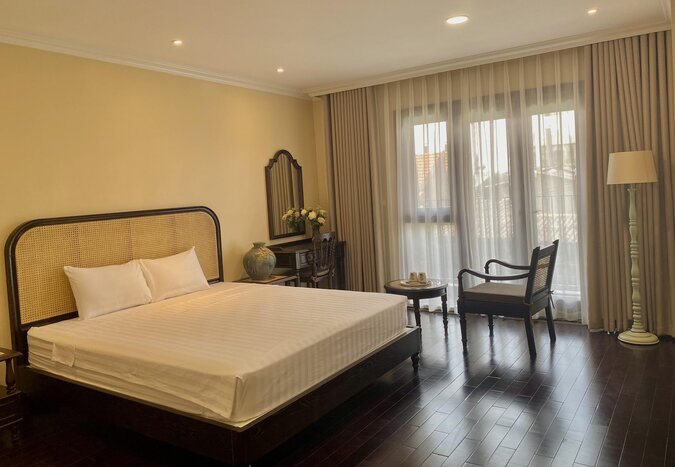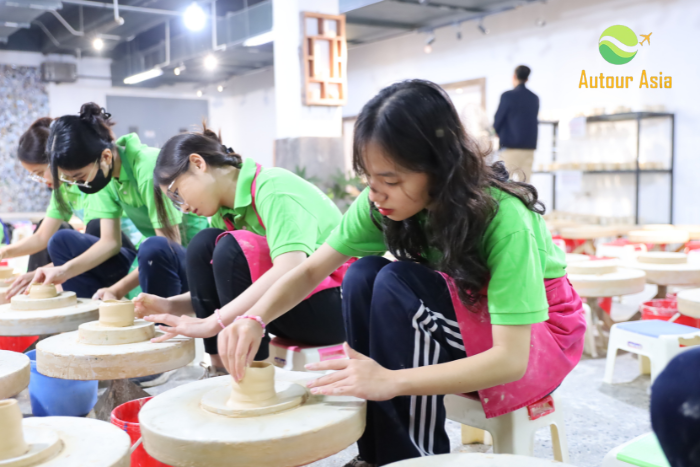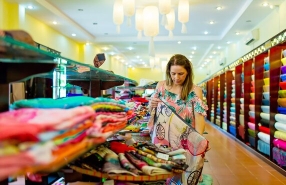Explore Vietnam more deeply by enjoying its unique culture and history, along with unforgettable experiences. Don't miss the opportunity to visit Hanoi - where you will discover Bat Trang Pottery museum, a magical place connecting the past and present of Vietnamese culture.
I. Introduction about the Center of Vietnam Quintessential Handicraft
1. Location of bat trang pottery museum
Bat Trang pottery museum (Bat Trang Ceramic museum), known as Center of Vietnam Quintessential Handicraft, situated in hamlet 5, Bat Trang Commune, Gia Lam District, within Hanoi city. It is approximately 15 km away from the city centre and offers a scenic view of the renowned Bac Hung canal. To reach Bat Trang Pottery Museum from Hanoi centre, you can take the budget-friendly bus number 47A directly from Long Bien station, or hail a taxi or book a Grab car for a more comfortable and convenient option. The journey should take around 30-45 minutes.
2. Entrance ticket & opening time
The Center of Vietnam Quintessential Handicraft extends a warm welcome to all visitors daily from 8am to 6pm. Admission prices are as follows:
| Ticket Type | Price |
| Entrance ticket & visit 1st, 2nd, 4th floors | 60,000 VND ( 3 USD) /person |
| Visit 3rd floor: CHON DE L'ART Contemporary Art Center | 90,000 VND (4 USD) / person |
| Free for children under 1m3 |
| Experience pottery making on G floor (ground floor) | 70,000 VND (3 USD) /adult |
| 50,000 VND (2 USD) / child under 1m3 |
| Huong Sa Art House tea meditation ticket on 5th floor | Entrance, enjoy tea and admire the work:
40,000 VND (1.5 USD) /person |
| Free for children under 1m3 |
| Costume rental: 100,000 VND/time (4.5 USD) |
For convenient transportation and sightseeing at the museum, you may consult combo ticket prices:
II. The story & special architecture of Center of Vietnam Quintessential Handicraft
1. The story behind Bat Trang Pottery Museum
Bat Trang pottery village was formed from the joining hands and contributions of 23 families who brought their profession from their old hometown to establish a ward. Now there are only 19 clans left. However, their dedication to preserving their ancestral heritage and constantly honing their craft remains unwavering. To pay tribute to the merits of the profession, to show gratitude to the ancestors, with a wish to preserve the good traditional values of Bat Trang pottery and literary village, Ms. Ha Thi Vinh, the 15th generation descendant of the family Ha Huu, a distinguished citizen of Hanoi, Vice President of the Vietnam Craft Villages Association, has devoted to building the Center of Vietnam Quintessential Handicraft. This centre aims to not only promote the rich cultural heritage of Bat Trang but also that of Vietnam as a whole. Her vision goes beyond conservation, seeking to ensure the continuity of these traditional values for future generations.
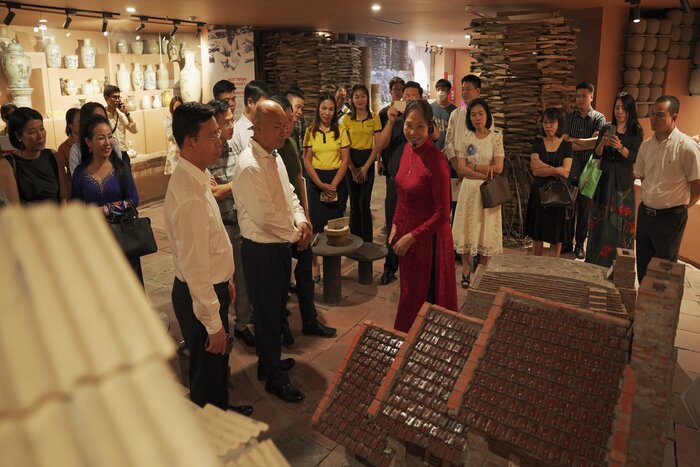
Ms. Vinh's inspiration came from a trip to Japan, where she witnessed the success of the "one village one product" program. With the desire to replicate this success for Vietnamese craft villages, especially Bat Trang, she hopes to create a centre to introduce these handicraft products to the market effectively and quickly for everyone to know more about Bat Trang pottery. The project was conceived more than 10 years ago and officially completed the basic construction in 2018.
2. The unique architecture of museum
Bat Trang Pottery Museum stands as an impressive architectural masterpiece, boasting a distinctive and captivating design crafted by architect Hoang Thuc Hao. The structure is made up of soft, curving curves that freely link together to form seven giant tornadoes. This architecture is inspired by the traditional "ceramic claw" turntable blocks of pottery villagers for hundreds of years. Alternatively, observers may envision the ancient gourd kilns used by the historic Bat Trang community. Bat Trang Pottery Museum is made in the form of a small bottom, getting bigger as it goes up, but still brings a feeling of stability and certainty. To create those unique swirls, the workers used thin linear reinforced concrete that has both a small load and can effectively withstand force. This massive project also takes advantage of many ancient materials of Bat Trang pottery village such as mosaic tiles, traditional ceramic tiles, fired packages... to create realistic colours.
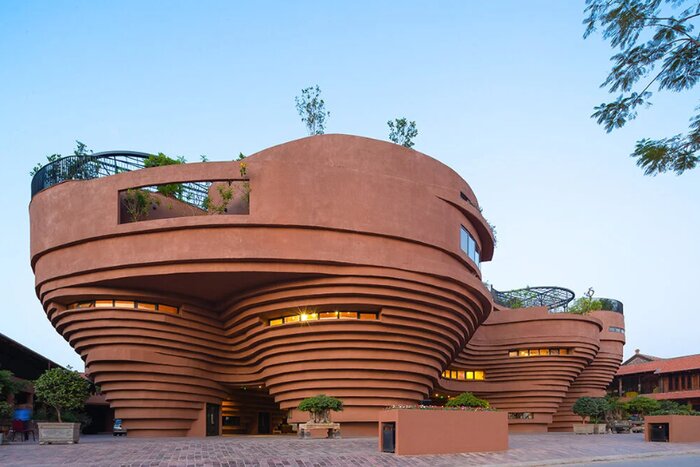
The work spans an area of 3700 square metres, consisting of a central museum block surrounded by ancillary structures on three sides, one facing the Bac Hung Hai River, the other facing Bat Trang village. The unique spiral design of Bat Trang ceramic museum not only brings uniqueness but also creates a wonderful atmosphere of creativity and enjoyment for visitors, exploring the journey of ceramic art in a unique way. The continuous repetition of soft curves throughout the architectural design mirrors the finesse of Bat Trang pottery and culture, reminiscent of its millennia-old heritage in traditional craftsmanship.The museum's main earthy brown colour tone is not only a harmonious choice with the main material of ceramic art, but also symbolises prosperity and abundance, creating a deep connection with local culture and characteristic of the pottery village.
III. What to see in the Bat Trang Pottery museum?
The Bat Trang Pottery Museum beckons to enthusiasts of traditional Vietnamese ceramic art, offering an ideal destination for those eager to delve into its rich heritage. A visit here promises not only insights into the history and intricate ceramic production process but also the opportunity for unforgettable and immersive experiences.
1. The first floor : Pottery Square
Upon arrival, visitors will be greeted by a visually impressive check-in area with giant tornado-like figures, a testament to the building's unique and artistic architecture, known as pottery square. The first floor of the building is a space to welcome visitors and booths selling quintessential products of Vietnamese craft villages, a place to introduce and sell typical products of traditional craft villages. Among them, there are nearly 50 famous Vietnamese handicraft stalls, products of OCOP quality, the majority of which are ceramic products of Bat Trang village.
This airy and spacious space serves many purposes. It provides a platform for artisans to display their most beloved ceramic works, fostering a deep connection between their artistic spirit and visitors. In addition, Pottery Square has become a vibrant gathering place, providing spacious space for product displays, traditional cultural festivals and many large-scale activities. As you explore this multi-purpose space, prepare to be fascinated by the evolution of Bat Trang ceramics - from ancient to modern glazes, each piece tells stories through changing colours, shapes, and patterns. decorative shapes and motifs.
2. The second floor: Simulating Bat Trang pottery village in the past and present
The second floor of the Bat Trang Pottery Museum welcomes tourists with a space displaying works associated with the development of the pottery village through the ages, while recreating familiar images of pottery. To learn interesting knowledge about Bat Trang pottery village as well as admire works of art from the past to present, visitors can explore the second floor space from left to right. The museum is a sophisticated space dedicated to permanent and thematic exhibitions of the Ancient and Contemporary Ceramic Craft Space of Bat Trang. This place not only serves as the centrepiece of Vietnam's precious ceramic heritage but also stands as a testament to the dedication and passion of Ms.Vinh, who poured her heart into preserving and advancing the Bat Trang ceramic craft heritage.
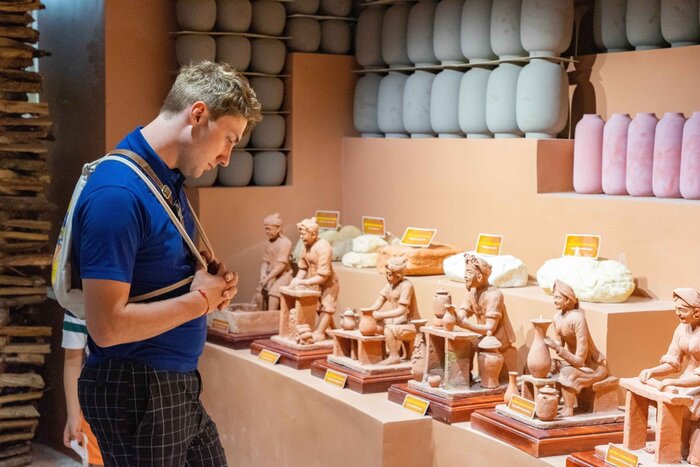
Stepping into this space, visitors will feel as though they have been transported to the very heart of ancient artisanal pottery kilns. Every nook is adorned with earth-toned walls, shelves stacked with ceramic products, and the flickering light from the kilns.
With a total exhibition area of 500m2, this museum offers various compelling themes, including: The formation and development of the Bat Trang ceramic village, Detailed narratives about the ceramic production process in the Bat Trang village, A recreated memorial house modelled after the home of artisan Le Van Van, Spaces dedicated to honouring and showcasing outstanding products from the 19 lineages of artisans currently producing ceramics in Bat Trang, individuals who have devoted themselves to preserving and developing the ceramic craft tradition. Lastly, a modest yet valuable exhibition space for those deeply interested in ceramics and its artistic research.
3. The third floor: Contemporary Art Center (CHON DE L'ART) and Homestay Art
The 3rd floor of Center of Vietnam Quintessential Handicraft is an art display area and is loved by many tourists, a place to experience modern and contemporary ceramic works, especially the CHON DE L’ART exhibition area. The exhibition area speaks of continuous updates and innovations in the context of ever-changing social trends. Coming here, visitors will experience ceramic works from contemporary to modern and clearly feel the continuous innovation of Bat Trang pottery village through many important milestones. In particular, visitors can not only view but also buy or auction art products here.
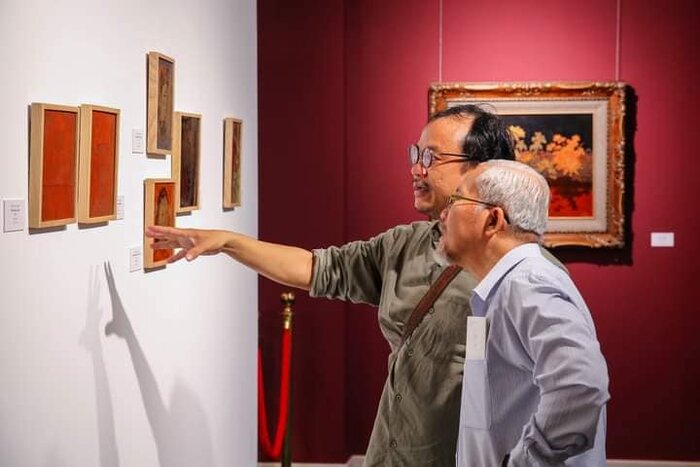
Homestay Art is located on the 3rd floor of Bat Trang museum - an address that combines relaxation, sightseeing and extremely unique and attractive experiences, including 9 rooms with different unique designs for visitors to rest. on the journey to discover craft villages. With extremely unique and outstanding architecture, the overall area and interior of each room are arranged and decorated with handicraft products from different craft villages such as Bamboo and rattan, lacquer, mother-of-pearl mosaic. guy... so that visitors can enjoy a resting space that blends with the cultural values of the craft village.
4. The fourth floor: the Royal Hall , Tinh Hoa Restaurant and Artisan Cafe
Inspired by the regal ambiance of the Tran Dynasty's royal court, the Royal Hall seamlessly blends traditional aesthetics with contemporary elements. Outstanding with 14 ironwood pillars, ancient tiled roof, flower lantern system and dragon details, the hall brings a luxurious and majestic space. The tiled floor is made of ancient tiles handcrafted from Red River alluvium, with unique Hoang Tho glaze colours, showing the cultural, historical and quintessential imprint of Bat Trang pottery. With an area of 300 square metres, the middle aisle is covered with red carpet, the stage is equipped with modern equipment, the hall meets the needs of organising large events, conferences, and welcoming groups of up to 200 people. This Hall is a perfect place for special events and cultural activities that celebrate the unique architecture, history, and ceramic traditions of Bat Trang
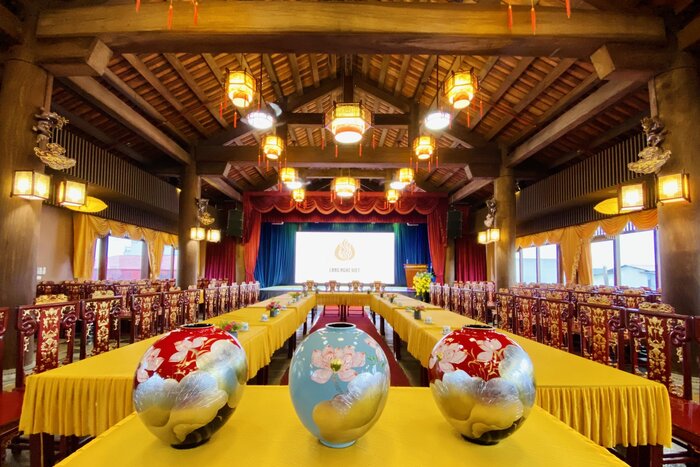
Famous for its ceramics and exquisite cuisine, Bat Trang museum owns Tinh Hoa restaurant that preserves the traditional flavours of the ancient capital Thang Long. Talented chefs recreate the "courtesy to the King" feast in an ancient Vietnamese space, bringing a unique experience to visitors. Tinh Hoa Restaurant is an ideal destination to enjoy delicious country dishes, with a diverse menu. form and richness. The rustic, simple design style and the flower garden to enjoy tea create a cosy, close atmosphere. With a business philosophy that focuses on customer joy and satisfaction, Tinh Hoa restaurant in Bat Trang museum promises to bring unforgettable culinary experiences to visitors when coming to Bat Trang. Don’t forget to stop by Artisan Cafe, you will be immersed in a green, airy space and admire the romantic Bac Hung Hai river. The prime location allows you to see far away, admire the majestic natural landscape and enjoy the fresh, peaceful atmosphere.
5. The fifth floor: Huong Sa Art House & Light Sculpture Art
Huong Sa Art House is an ideal destination for tourists looking for peace and tranquillity, a famous brand combining the quintessence of Bat Trang ceramics and the beauty of the romantic Perfume River. Huong Sa Art House offers visitors an elegant tea enjoyment space, with unique works of art and 20 unique types of Vietnamese tea. This place is also an ideal destination for tourists to preserve beautiful moments with a collection of ancient Vietnamese costumes. Come to Huong Sa Art House to enjoy serenity and peace every weekend.
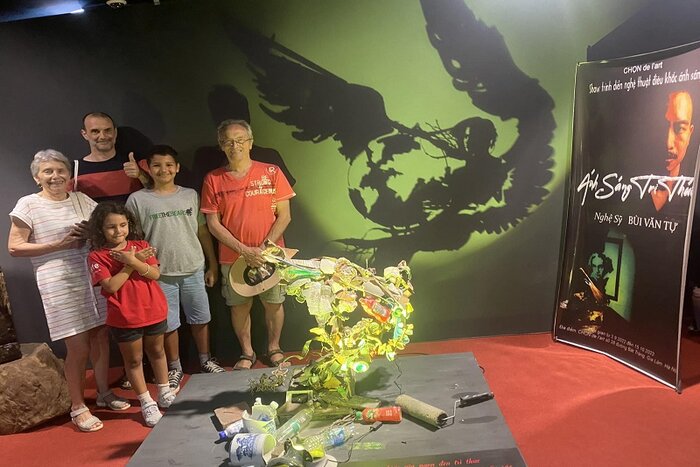
A must-see within the Center of Center of Vietnam Quintessential Handicraft, located on the 5th floor, is the captivating Light Sculpture Art space, where the combination of traditional sculpture of materials: ceramic, wood, bronze, stone... and light creates impressive and unique paintings. The owner of this work is Bui Van Tu, a young man born in 1992 - the author of the first and only light sculpture art in Vietnam. The created works are inspired by Buddha, or literary stories, businessmen, and artists. From here, many images will appear thanks to lighting techniques, giving viewers a beautiful association with life and humanity.
6. The G floor: Studio Turntable, experience pottery making on ground floor
At Studio Turntable, which is situated on the ground floor of the Bat Trang Museum, you're in for an exciting pottery-making experience that never fails to captivate the countless tourists who frequent the museum. Here, visitors are welcomed into a vibrant and interactive environment where they can fully immerse themselves in the art of ceramic creation. visitors can experience the role-playing "I am an artist".
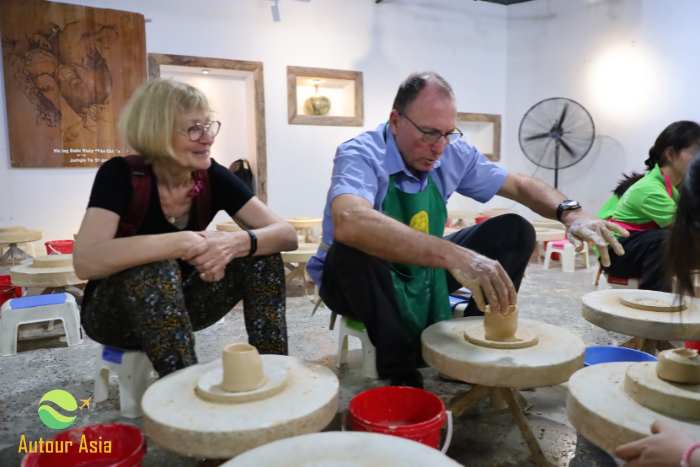
This studio serves as a haven where individuals are encouraged to unleash their creativity according to their unique tastes and preferences. Guided by skilled artisans, participants have the opportunity to explore a multitude of pottery techniques and craft their own distinctive ceramic pieces in various shapes and forms. What sets Studio Turntable apart is its inviting ambiance and hands-on approach, making it an ideal destination for both novices and seasoned ceramic enthusiasts alike. Whether you're a beginner eager to discover your artistic potential or an experienced hobbyist seeking a fulfilling and enjoyable pottery experience, Studio Turntable promises a memorable journey filled with creativity and relaxation.
IV. Useful advice for your trip to Bat Trang Pottery Museum
Comfortable Attire: Wear comfortable clothing and shoes suitable for walking, as you may spend several hours exploring the museum and nearby pottery workshops.
Respect Cultural Norms: Remember to dress modestly and respectfully, especially if visiting any religious sites or interacting with local artisans. Always ask for permission before taking photographs, particularly of people or their private property.
Engage with Artisans: Take the opportunity to interact with local artisans and learn about their craft. Many artisans are happy to share their knowledge and techniques, providing valuable insights into the pottery-making process.
Explore Beyond the Museum: Venture beyond the museum to explore Bat Trang Pottery Village itself. Wander through the narrow lanes lined with pottery shops, visit workshops to observe artisans at work, and perhaps even try your hand at pottery-making with a hands-on workshop.
Support Local Businesses: Consider purchasing souvenirs directly from local artisans or at the museum's gift shop to support the local economy and preserve traditional craftsmanship.
Enjoy Local Cuisine: After exploring the museum, indulge in delicious local cuisine at nearby restaurants or street food stalls, sampling traditional dishes served on intricately designed ceramic tableware made in Bat Trang.
Delve into the rich heritage of Vietnamese ceramics at the Bat Trang Pottery Museum. Through captivating exhibits, you'll discover the village's centuries-old craft and the meticulous techniques that bring these exquisite pieces to life. With its extended weekend hours and reasonable entrance fee, the Bat Trang museum offers an unforgettable cultural experience for all.
Hopefully this information we provided above will be beneficial for your journey to explore the authentic
Bat Trang Pottery Museum.
AUTOUR ASIA, best Vietnam local agency, looks forward to your visit to this stunning destination, anticipating that it will be a memorable and enchanting experience.

